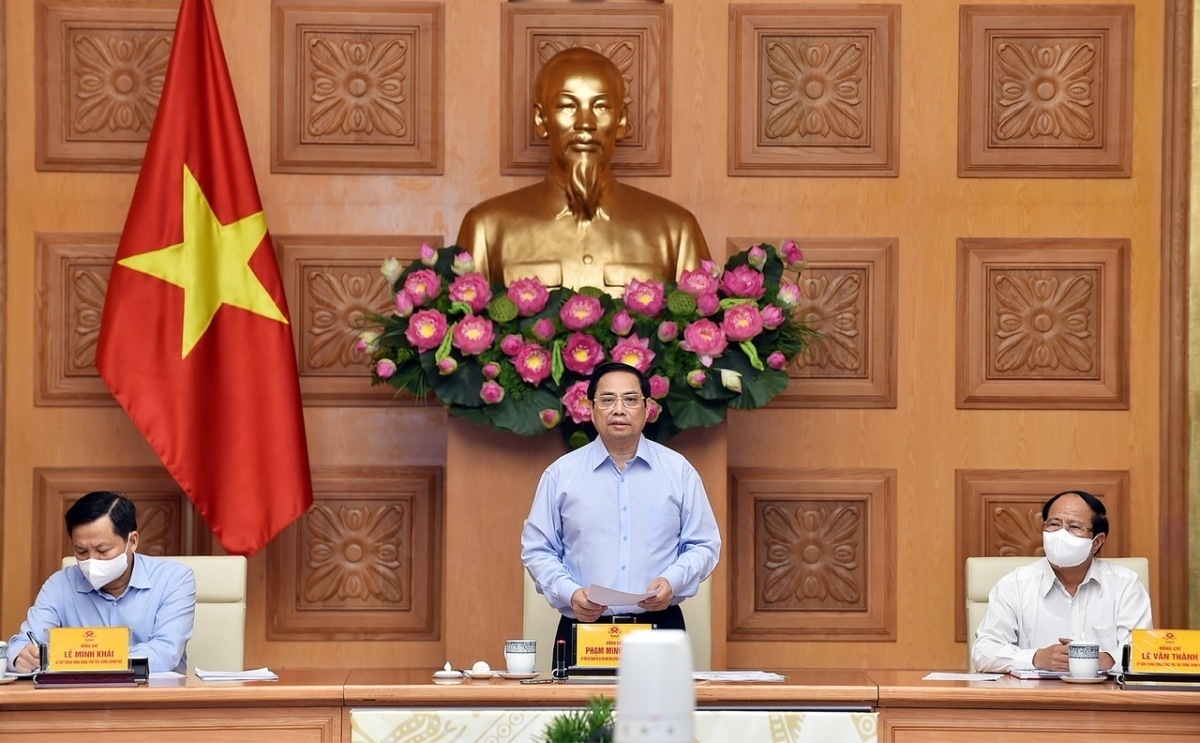
A workshop discussing solutions to maintaining production during Covid-19 was organized recently by the Vietnam Chamber of Commerce and Industry (VCCI) and Central Institute of Economic Management (CIEM).
Vu Duc Giang, chair of the Vietnam Textile and Apparel Association (Vitas), said the social distancing under Directive 16 in many localities has put pressure on the business community, and stifled production activities in 19 southern provinces. Some localities have not been flexible when implementing the directive, and some enterprises with no Covid cases have had to close.
According to Giang, 97 percent of textile and garment makers in the southern localities had to suspend their operations due to the resurgence of the coronavirus.
The textile and garment industry is running at just 10-15 percent of capacity. Vietnamese enterprises have been urged by foreign partners to deliver products such as garments because no one wants to receive products when the sale season is over.
Some garment companies were thinking of outsourcing to garment companies in the north. However, it is difficult to transport materials from the south to the north and go through checkpoints on the way.
“Some foreign partners thought of placing orders with other countries instead of Vietnam to ensure uninterrupted supply chains. Many companies have been put on tenterhooks,” Giang said.
| Some garment companies were thinking of outsourcing to garment companies in the north. However, it is difficult to transport materials from the south to the north and go through checkpoints on the way. |
However, he believes that the shift of orders to other countries is just a temporary move. In long term, Vietnam will still be one of the best destinations for garment brands.
Nguyen Duy Minh, Secretary General of the Vietnam Logistics Association, said that the cargo transportation is like "a lock with four keys". The keys are the negative test for drivers as per the request of the Ministry of Health, the QR Code and ‘green passage’ required by the Ministry of Transport, ‘essential goods’ transported only as required by Minister of Investment and Trade, and checkpoints established by local authorities.
All four factors have caused transportation costs to soar.
Ly Kim Chi, chair of the HCM City Food and Foodstuff Association (FFA), said if food and foodstuff companies don’t operate, the supply chain will be disrupted.
Meanwhile, production organized in accordance with the ‘three on-the-spots’ principle can work only for a short time. Workers have begun feeling depressed as they cannot go home. Enterprises have to prepare three meals a day for workers and some of them are given an allowance of VND200,000 a day. But this is not enough to retain all of them.
Nguyen Hai Minh, vice chair of EuroCham, said the foreign business community also feels anxious. The worry about the disruption of domestic and international supply chains continues, while there is no detailed guidance from the Government. The regulations set by different localities vary, especially the requirements on ‘essential goods’.
Analysts said the US and European markets have opened their doors again and demand has begun to increase. Enterprises need to minimize downtime, or will be excluded from the supply chain.
As tens of thousands of workers have returned to their hometowns, this will lead to a labor shortage. If so, it will be difficult to ensure supply and organize production to fulfill big orders placed by multinationals.
The four industries of textile and garment; footwear and handbag; electronics; and wood and woodworks have total export turnover of $150 billion a year, which accounts for 60 percent of the country’s total export turnover. The industries employ 8 million workers. Supply chain disruption, if it occurs, will affect socio-economic development.
Businesses seek self-determination
Do Thuy Huong from the Vietnam Electronics Industries Association (VEIA) said the Government and ministries need to change their view and consider businesses as one of the key forces to cooperate, instead of a subject under Government control, in terms of pandemic prevention. The Government needs to build a standard process for specific cases to help enterprises take the initiative in organizing production and fighting the pandemic.
Businesses cannot continue to close their doors even if the pandemic lasts a long time. If they do, production chains will be disrupted and workers won’t have jobs. Enterprises also need help to organize production and take on-site medical control.
“We propose that the Government allow enterprises to take responsibility for transporting their workers between home and workplaces, while following standard medical care process. The Government should allow enterprises to buy rapid testing devices to test their workers. The Ministry of Health (MOH) needs to set up a process which helps enterprises learn how to detect and handle infected cases (putting workers under quarantine at factories, bringing to hospital, etc…) to protect ‘green zones’ and continue production.
Economist Nguyen Dinh Cung, former head of CIEM, thinks that it would be better to let enterprises operate as usual and take responsibility themselves.
Enterprises should be given more autonomy in protecting their workers. He suggested removing the list of ‘essential goods’ and setting the same requirements for drivers (testing results, validity, testing method) throughout the country.
Tran Thuy

Southern provinces seek approval to end stay-at-work requirements
After one month of letting their workers stay at work, many businesses in southern Vietnam are seeking approval from the authorities to allow their employees to return to their own residences.

Production, supply chains must be maintained amid COVID-19 threats, PM orders
Prime Minister Pham Minh Chinh on August 8 asked localities and businesses to try their best to maintain production and business services amidst the complicated evolution of the fresh coronavirus outbreak.
